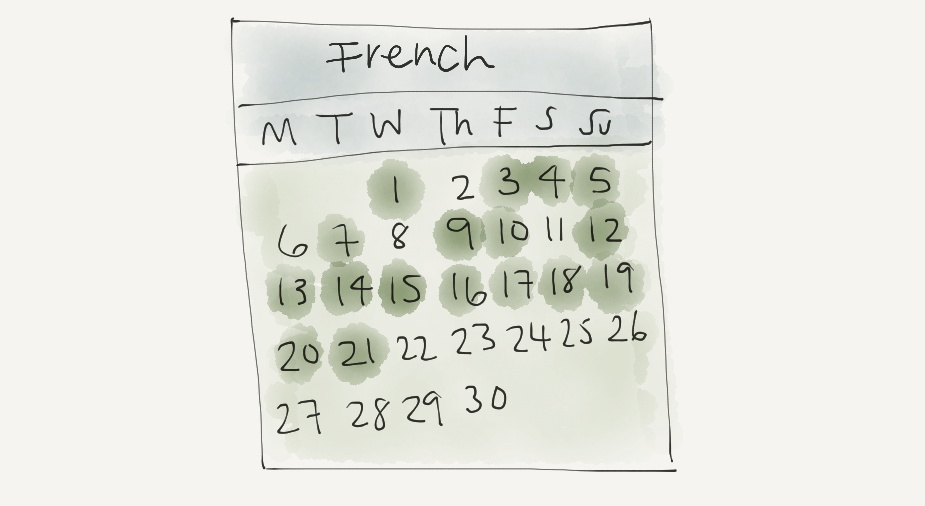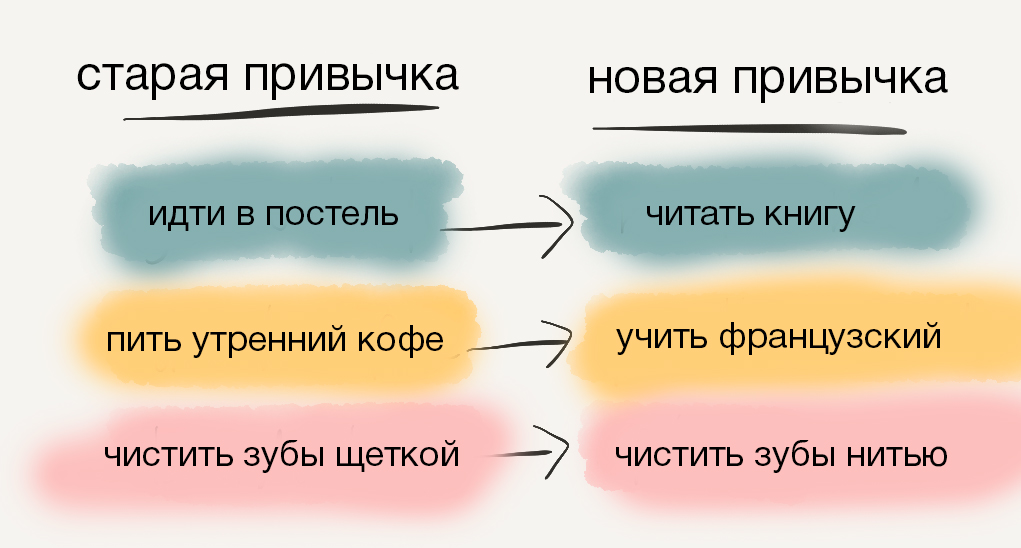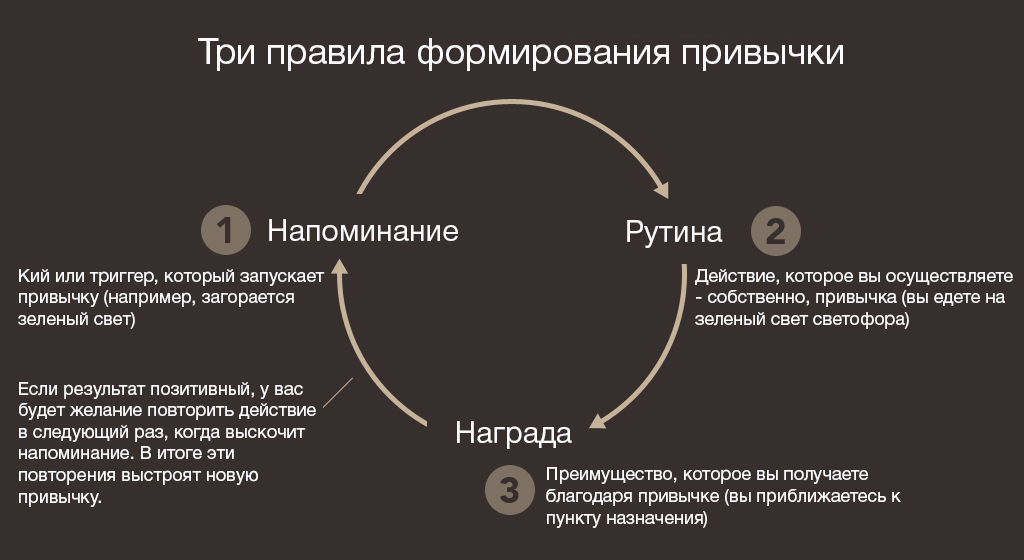How to learn to get up early, read more and learn languages

From Monday, we can all: quit smoking, play sports, drink more water and less coffee. But how to make it so that Monday's business is not limited?
Develop a habit , says freelancer and life-coach Belle Cooper. And it sounds much easier than it seems: you just need to remove barriers and not take on too much. Want to read more - start with one page a day, because it's so simple that it's even a shame to otmazyvatsya.
I prefer to work efficiently, not much, and I am constantly looking for ways to ease this task myself. Two years ago I became the leading writer Buffer - and I had a chance to delve into the topic. Now I am ready to present the results.
It all started with the habit of studying French only five minutes a day. A year later I can read, write and speak basic French. And now I read five times more books a year than a couple of years ago. It sounds powerful, but it's easier to achieve than it seems. I developed small daily habits that eventually turned into serious results.
To create a new habit, I adhere to the four rules that always work.
1. Start small: repeat the same action every day
When I set out to improve my life a few years ago, the first mistake I made was that there were too high demands on myself. I tried to force myself to read one book a week and get up at six in the morning instead of 9, as usual.
The difference between how I lived and how I wanted to live was so huge that I constantly failed. And each such failure increasingly demoralized me on my way.
What I really needed was to achieve small victories and build daily habits from them. In the end, I thought of this and focused on repeating the same actions every day, not particularly soaring about the exhaust. In other words, first the quantity, then the quality.
An excellent example is cleaning teeth with a thread. You want to do this every evening, but for years you do not pick up the dental floss. If you get the hank of a dark box and plan each evening to devote 10 minutes to cleaning, you will not last for weeks in this mode, because you ask too much for yourself.
But small beginnings are so effective that they look like super strength. It works like this: you take on the smallest thing you can work with. In the case of flossing, clean only one tooth. This is also a cleaning of the thread, but you will not achieve a significant breakthrough in the field of oral hygiene.
But that's the power. At first you concentrate on cleaning only one tooth every evening. And so the whole week. Then two, three, four. You quickly get used to it, because there is nothing complicated in this. To clean one tooth, you expend so little effort that you can not think of the reason for not doing it. And as soon as the habit comes to automatism, you begin to clean two teeth a day. For a while, you brush your two teeth every night. Then three. And so gradually increase their number, never trying to suffice too much, so that laziness does not become.
We tend to overestimate our capabilities, especially when it comes to what we did not do before. It is better to be realistic and start with 20% of the time and effort from those that we would like to devote to a new cause.
Reading: Page per day
I started reading one page of the book every night before going to bed. Sometimes I read more, but if I did not want to, I read my established minimum and considered the mission accomplished. Later, when this habit was already rooted, I started counting down the time and devoting at least 15 minutes to the reading every day until it reached 30 minutes every evening and another 30-almost every morning.
In 2013, I read seven books. In 2014, 22, in 2015 - 33. Almost five times more than in 2013.
I worked on this habit for a year and a half. It sounds like it's a lot, but it only seems so.

When I'm working on a habit, all that I think about is how much I need to read to consider that I have successfully fulfilled the obligation to myself. It's always a little effort, on which I focus. But when I look back on the progress, I understand what remarkable results I manage to achieve thanks to these little daily habits.
French: One lesson every morning
I used to play French, but I did not get to practice regularly. When I decided that I really wanted to improve my French, I began to build the habit of doing one lesson on Duolingo every morning while drinking coffee (in case you do not know, Duolingo is a free web and mobile application that allows you to study Different foreign languages).
One lesson takes about five minutes, so this is a tiny commitment and a very simple task if you are in any case used to sitting and drinking coffee in any case. Over time, I began to do more than one lesson - two, three, sometimes four or even five, if there was a desire. But one lesson was the mandatory minimum that I performed, even if there was no desire.
Just one lesson per day is enough to make the habit take root - well, what's difficult in this? Today I also use Babbel (a paid application for learning languages) to better understand the grammar and structure of the French language, and on Duolingo I have already passed the whole section - this means that I know French by 41%! This is a solid achievement for five minutes a day.
2. Focus only on one habit at a time
Personally for me, the most difficult thing in building a new habit is not to take on too much. I have a tendency to lean on something with such enthusiasm that it's time to start building several habits at once.
Every time I applied this approach, everything ended badly. Sometimes it does not work to root a few habits, and sometimes none at all. It's like multitasking, when the brain has to constantly switch, because you just can not focus on several things at once.
So I made it a rule to work overnight on just one habit. And only when this habit is so automatic that I stop noticing how I follow it, you can proceed to build a new one. I read every night, and only then I switched to French. And when I was used to learning every day, I began to work on the habit of getting up early.

Sometimes it takes a long time to build a habit. And early ups were hardest for me. I spent about four months focusing on this: I tried different approaches, monitored progress and reported to friends who helped me. I was determined to make it a habit, but at the same time it meant that I could not go on to form any other habits until I achieved my goal.
Today I'm glad that I did not give up, because without problems I wake up early almost every day. It was not easy, but it was worth it.
The time that you will need to form one habit, for everyone individually. It took me four months, you can get more, maybe less. They say that it takes 21 days to develop a habit, but studies show that everyone has his own time for rooting new habits. In one study, the subjects took an average of 66 days, about two months.
I realized that every habit should be perceived in different ways, depending on how difficult it is for you to adhere to it. And not yet work on several habits at the same time, but concentrate all time and energy on only one.
3. Eliminate barriers: keep everything you need at your fingertips
I also found that it's much easier to acquire a habit if you always have the tools at hand. For example, when I drink coffee and I already have my phone in my hand - it's easier for me to begin the French lesson right away. Reading before bedtime became easier when I started to hold the book by the bed.
Some call it a turning point. This is a small change that keeps you from making excuses, not to do it. One cool example of a tipping point is contained in a study of the study of tetanus in the Pedagogical University. The study examined this question: Will the fear of infecting people with tetanus cause the students to be vaccinated against it? The level of fear did not cause any noticeable changes, but the study did reveal one valuable observation: when a card with the designation of a medical room and the time of admission for tetanus vaccinations were hung on the campus, the number of vaccinations increased from 3% to 28%.
A turning point is a small change that makes the task simple enough to get started right now. I like to think of this as removing barriers, so that it's enough to reach out for the action or even less.
One habit that I started in 2016 is to play the piano more often. Now I play only when the muse rolls around, and that's enough to improve a little. But I noticed that it's easier to sit down at the piano when it's in the access zone. Now it is in the corner of the dining room, so I can always sit down and play a little while I wait for something to cook, or after an evening snack.
Another habit I want to work on this year is to exercise regularly.
I noticed that when I wear sports clothes, I'm most likely going for a run, but until I put it on, I can think up as many reasons as possible to not go.
If I put the sports uniform in a prominent place in the evening, then in the morning the likelihood that I will dress in it and make myself engaged, greatly increases. This is exactly what I plan to do more regularly when I concentrate on this habit.
4. Build habits: build new habits on old
One of my favorite ways of building new habits is to add them to the old ones. This helps to build a few habits in the daily routine, and each of these habits serves as a trigger for the other.
You probably already have a lot of habits that you do not even realize. Brushing your teeth before going to bed, getting out of bed in the morning, making coffee at the same time - these are all existing habits. If you do something every day, without even thinking about it, attach new habits on the side.

By making one habit, you will automatically move on to the next. For example, when I get out of bed, the first thing I do is go to the kitchen to make coffee. When the coffee is ready, I begin the lesson of French. My current habit of making coffee serves as a trigger for the habit of learning French. And when I go to bed in the evening, I take a book from the bedside table and read, sitting in bed. That is, when I sit in bed, triggers trigger, that it's time for me to read.
The study suggests that this is the surest way to stick to new habits when you are just starting to build them. Gradually, you build on old habits more and more, taking advantage of the fact that you are already doing old ones on the machine.
For me, building new habits has become something of a hobby. I like to think about all the improvements that I will eventually achieve, just getting used to new small actions day in and day out. Thanks to this, significant results are much more achievable.
Via ain.ua



Comments
Commenting on, remember that the content and tone of your message can hurt the feelings of real people, show respect and tolerance to your interlocutors even if you do not share their opinion, your behavior in the conditions of freedom of expression and anonymity provided by the Internet, changes Not only virtual, but also the real world. All comments are hidden from the index, spam is controlled.